4th Annual Indigenous Awareness Week
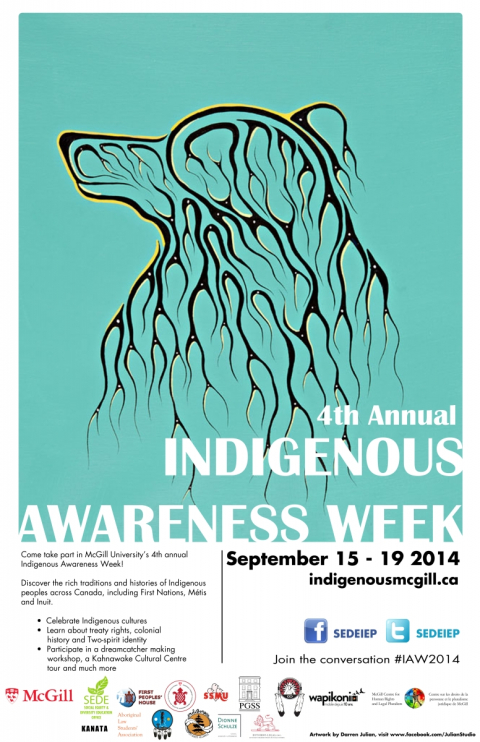
McGill University’s Indigenous Awareness Week is designed to increase awareness at McGill about Indigenous peoples in Canada. The week honours the many Indigenous cultures across the country including First Nations, Métis and Inuit. The week also offers an opportunity to collaborate with community partners and draws active participation from McGill students, faculty and staff.
The week is organized by the Social Equity and Diversity Education Office at McGill University.
SEDE’s Indigenous Educational Program seeks to develop a broad-based educational campaign by providing Indigenous-specific programming and opportunities for bridge-building among diverse members of the McGill community.
For more information, please contact the Indigenous Education Advisor, Allan Vicaire, via email at allan.vicaire [at] mcgill.ca or by phone at (514) 398-3711.
Monday, September 15,2014
OPENING CEREMONY
12:00PM – 3:00PM, Ballroom, Thomson House, 3650 McTavish Street
The Opening Ceremony for the 4th annual Indigenous Awareness Week will begin with a welcoming address and blessing from McGill’s elder Alex Sonny Diabo. The warm welcome will be followed by a performance by Odaya. Finally, our keynote speaker Dr. Kahente Horn-Miller, New Sun Visiting Aboriginal Scholar of Carleton University, will be discussing the relationships between Indigenous people, academics and students and explore how traditional Mohawk philosophy is woven in bridge building between these communities
Opening Ceremony Schedule:
- 12:00PM – 12:30PM: Lunch Buffet
- 12:30PM – 1:00PM: Welcoming Address and Blessing
- 1:00PM – 1:20PM: Performance by Odaya
- 1:20PM – 2:10PM: Coming to One Mind: Building Responsible and Accountable Relationships In and Out of the Academy with Dr. Kahente Horn-Miller
- 2:10PM – 2:30PM: Closing Remarks
About the Speaker:
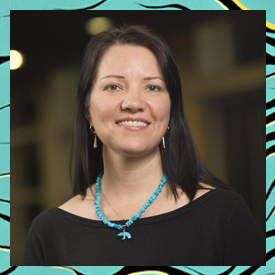
Dr. Kahente Horn-Miller (Kanien:keha’ka/Mohawk) received her doctorate in 2009. She currently holds the position New Sun Visiting Aboriginal Scholar at Carleton University. Formerly, she was Coordinator for the Kahnawà:ke Legislative Coordinating Commission, the body that oversees the legislative development process based in Haudenosaunee principles of consensus building. She was also sessional lecturer at McGill University. As an active member of her community, Dr. Horn-Miller continues to research and write on issues that are relevant to her work and academic interests such as Indigenous methodologies, women’s issues, identity politics, colonization, governance, and consensus-based decision making. Her governance work and community-based research involves interpreting culture and bringing new life to old traditions and practices. She is currently working on revising a manuscript for publication on the Mohawk Warrior Flag which came to prominence during the Oka Crisis of 1990. There she examines the development and evolution of a symbol of resistance and unity in the Indigenous rights movement. As an expression of the Kaienere’kó:wa (Great Law of Peace), the Flag has managed to transmit key philosophical aspects of Haudenosaunee tradition in a way that is accessible. She continues to live and work within her community along with writing and publishing in her areas of interest, most notably, her recent work on Participatory Democracy and the Sky Woman’s story. She sees her work as an active response to colonialism as she continues to build bridges between Kanien’kehá:ka people and the wider society at large. She says – “We have a responsibility to use our knowledge and good minds to help make a future where our communities are strong and self-determined; to foster relationships between our people that goes beyond the written word or the classroom and research settings. We have a lot important knowledge to share.”
THE TREATY OF NIAGARA 1764 AND CANADIAN CONSTITUTIONALISM TODAY: CROWN/FIRST NATIONS RELATIONS 250 YEARS IN
5:00PM – 7:00PM, Moot Court, New Chancellor Day Hall, 3644 Peel Street
The Royal Proclamation of 1763 is recognized as one of Canada’s founding constitutional documents, and is sometimes referred to as a “Bill of Rights” for Indigenous people. Less well-known and recognized in Canadian classrooms and jurisprudence is a treaty entered into a year later, in July and August 1764, when about 2000 First Nations chiefs gathered at Fort Niagara to meet with British superintendent of Indian Affairs, Sir William Johnson. The treaty of peace, friendship and respect entered into at Niagara 250 years ago set out a framework for Indigenous and British co-existence on Turtle Island, as the British were brought within the normative web of relationships already existing on Turtle Island. Included in the treaty negotiation was the reading of the text of the Proclamation – but the negotiations and terms of the eventual treaty were richer than the plain text of the document. Come out on September 15th to learn about the Treaty of Niagara and its implications for understanding the Royal Proclamation, the development of present-day Canada, and the Crown/First Nations relationship. The first speaker for the evening is Al Corbière from Manitoulin Island, a carrier of a Niagara wampum replica, who will explain the historical context in which the Treaty of Niagara was negotiated, as well as the meaning and significance of wampum belts that embody the Treaty of Niagara. The second speaker is Aaron Mills, Trudeau and Vanier scholar and PhD candidate at the University of Victoria, who will discuss the significance of the Treaty of Niagara from the perspective of Anishinaabe law and constitutionalism and its implication for Canadian constitutionalism.
The Centre for Human Rights and Legal Pluralism and the Aboriginal Law Students’ Association are proud to host this event as part of Indigenous Awareness Week 2014, in partnership with the Office of Social Equity and Diversity in Education. They would like to thank all event supporters, particularly Dionne Schulze S.E.N.C. and Hutchins Legal Inc. for their generous contributions that helped make this event possible.
About the Speakers:

Aaron Mills is a Bear Clan Anishinaabe from Couchiching First Nation, Treaty 3 Territory, and from North Bay, Ontario, Robinson-Huron Treaty territory. In 2010 Aaron obtained a J.D. from the University of Toronto, where he was editor-in-chief of the Indigenous Law Journal and sat on the board of directors of Aboriginal Legal Services of Toronto. In 2011, he completed articles at Olthuis Kleer Townshend LLP, where he worked on an Aboriginal title file, a treaty rights file, myriad duty-to-consult files, assertions of Indigenous law, and the protection of a sacred Anishinaabe site. Aaron earned an LL.M. at Yale Law School as a Fulbright Scholar in 2012. Currently Aaron is a Trudeau Foundation Scholar, a Vanier Canada Scholar, and a doctoral student in the University of Victoria’s Law and Society Program. He sits on the board of directors of the Indigenous Bar Association.
Alan Ojiig Corbiere, Bne doodem (Ruffed Grouse clan), is an Anishinaabe from M'Chigeeng First Nation on Manitoulin Island. He was educated on the reserve and then attended the University of Toronto for a Bachelor of Science, he then entered York University and earned his Masters of Environmental Studies. During his masters studies he focused on Anishinaabe narrative and Anishinaabe language revitalization. For five years he served as the Executive Director at the Ojibwe Cultural Foundation (OCF) in M'Chigeeng, a position which also encompassed the roles of curator and historian. During his time at the OCF he studied wampum belts and the Anishinaabe perspective on their meaning. Currently he is the Anishinaabemowin Revitalization Program Coordinator at Lakeview School, M'Chigeeng First Nation.
In Partnership With: Dionne Schulze S.E.N.C., Hutchins Legal Inc., and McGill Centre for Human Rights and Legal Pluralism.
Tuesday, September 16, 2014
KAIROS BLANKET EXERCISE
10:00AM - 12:00PM, Room 200, Coach House, 3715 Peel Street

An interactive exercise on the relationships between the Crown and Canada’s Indigenous populations, from the settlers’ arrival to modern times. Participants are guided through centuries of denial of Indigenous nationhood and the gradual appropriation, relocation, and removal of Indigenous peoples and territories.
The exercise begins with blankets spread across the floor, which represent land occupied by Canada’s Indigenous populations. As participants are guided through centuries of negotiations, treaties, decrees, and other interactions with European settlers, the blankets on which they stand are slowly removed, until only a few participants remain on a small area representing what little remains of Indigenous territory today. The exercise will then be followed by a talking circle.
This event is hosted by Allan Vicaire, Indigenous Education Advisor, and Paige Isaac, Coordinator of the First Peoples’ House.
Spaces are limited. Register by e-mailing asp.sede [at] mcgill.ca
TRADITIONAL DANCING WORKSHOP
1:00PM - 2:00PM, Lower Campus

The Indigenous Student Alliance invites the McGill community to join them in Three Bares Park for an interactive showcase on Indigenous dance and music. This will be an opportunity to get moving and experience some First Nation traditional dancing first-hand.
In Partnership With: Indigenous Student Alliance.
HOLDING THE ACADEMY ACCOUNTABLE: INDIGENOUS STUDIES AND COMMUNITY INCLUSION
2:00PM - 400PM, Lev Bukhman room (2nd Floor), SSMU Building, 3480 McTavish Street
About the Speakers:
Will Straw is Director of the McGill Institute for the Study of Canada and Professor within the Department of Art History and Communications Studies. His research focuses on urban culture, and Canadian culture, with a particular emphasis on music and cinema. Dr. Straw is co-editor of the Cambridge Companion to Rock and Pop, Circulation and the City and numerous other volumes. He is the author of over 125 articles on Canadian culture, media and cities.
Dr. K. S. Hele is a member of the Garden River First Nation community of the Anishinaabeg people, and educated at schools in Sault Ste. Marie. He earned a B.A. (Waterloo) in 1993, a M.A. (Toronto) in 1994, and a Ph.D. (McGill) in 2003. His dissertation examined the Ojibwa encounter with nineteenth-century missionaries to Sault Ste. Marie. More recent publications have examined how the international border has affected First Nations communities in the Great Lakes region. He continues to work on this topic as well as the Hiawatha Pageant and other items of interest not only to himself but the Bawating Anishinaabe community. Currently he is a contributing columnist to the Sault Star (www.saultstar.com) as well as an occasional writer for Anishinabek News (anishinabeknews.ca).
Marsha Vicaire is Mi’gmaq from Listuguj, Quebec. As a Mi’gmaq speaker, her identity is strongly rooted in her language and culture. Currently, she is a doctoral student in the Department of Educational and Counselling Psychology at McGill University. Her research interests include understanding the educational experiences of Indigenous students of higher education and examining factors that foster or impede academic success of students from marginalized backgrounds. Prior to applying to graduate school, she worked within the field of First Nations education at local and regional levels. In Partnership With: the Students' Society of McGill University
WAPIKONI MOBILE: 10 YEARS OF INDIGENOUS FILMMAKING
6:00PM - 8:00PM, Room 26, Leacock Building

In celebration of their 10 years of Indigenous Filmmaking, Wapikoni Mobile has put together 15 short films to display their unique films, diverse filmmakers, and a variety of Indigenous peoples, cultures, struggles, and traditions from around the world. There will be subtitles in English, as the films are in many different languages.
In Partnership With: Wapikoni Mobile
Wednesday, September 17, 2014
KANIEN’KEHÁ:KA ONKWAWÉN:NA RAOTITIÓHKWA LANGUAGE AND CULTURAL CENTRE TOUR
9:00AM - 1:00PM, Kahnawake Cultural Centre

Join us on a tour of the Kahnawake Cultural Centre’s permanent exhibit which showcases the rich culture and history of Kanien’keha:ka. Beginning with the foundation of the Haudenosaunee Confederacy to the 1990 Oka Crisis, the permanent exhibit features key cultural and historical events that best explain who the Kanien’kehá:ka people are.
Space is limited. Register by e-mailing asp.sede [at] mcgill.ca
DREAMCATCHER MAKING WORKSHOP (STAFF AND FACULTY ONLY)
12:00PM - 2:00PM, Arts Council Room, Room 160, Arts Building
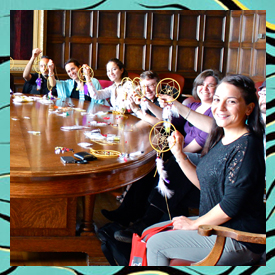
Explore your creative side and discover a part of First Nations traditional craft: the Dreamcatcher. The workshop will be led by Marie-Celine Charron from the Naskapis First Nation of Kawawachikamach.
DREAMCATCHER MAKING WORKSHOP (STUDENTS ONLY)
2:00PM - 4:00PM, Arts Council Room, Room 160, Arts Building
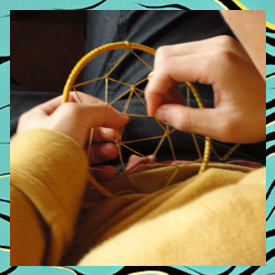
Explore your creative side and discover a part of First Nations traditional craft: the Dreamcatcher. The workshop will be led by Marie-Celine Charron from the Naskapis First Nation of Kawawachikamach.
Spaces are limited. Register by e-mailing asp.sede [at] mcgill.ca
FILM SCREENING: INUUVUNGA: I AM INUK, I AM ALIVE
7:00PM - 9:00PM, Room 26, Leacock Building
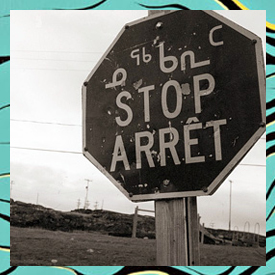
In this feature-length documentary, 8 Inuit teens with cameras offer a vibrant and contemporary view of life in Canada’s North. They also use their newly acquired film skills to confront a broad range of issues, from the widening communication gap between youth and their elders to the loss of their peers to suicide. In Inuktitut with English subtitles.
In Partnership With: KANATA.
Thursday, September 18, 2014
TWO-SPIRITS: HISTORY AND SURVIVAL
12:00PM - 2:00PM, Native Friendship Centre of Montreal, 2001 Saint-Laurent Boulevard

Prior to European contact, third and fourth gender people, known today as Two-spirit people, were pillars of strength in many Indigenous communities. Two-spirit people identify themselves in both female and male gender roles. An integral part of Indigenous society, they were ceremonial leaders, healers and shamans.
Ben Geboe will explore the history of Two-spirit people and how colonization diminished their role in their own communities. In addition, how in the last few decades there has been a resurgence and revitalization in Two-spirit identity.
About the Speaker:
Ben Geboe was born and raised on the Rosebud Sioux Reservation in South Dakota. He is an enrolled member of the Yankton Sioux Tribe and is very active in the Indigenous community in Montreal, New York City and in his community. Currently, he is in the PhD Social Work program at McGill University. He holds a Master in Social Work from Columbia University ('96). He has 10 years of experience working in hospital quality improvement at the New York City Health and Hospitals Corporation, and has conducted 75+ Rapid Improvement Events in Perioperative Services, OPD Medicine Clinic and Revenue Cycle functions. He led a project to use Lean A3 to improve the diagnosis and treatment of cancer, which he presented at the Cochrane Collaboration conference in Quebec City. Currently, he is working with Wendy Thomson on defining Native/Aboriginal healthcare leadership. He is Chairman of the Board of Directors of the American Indian Community House, Inc. in New York City and is an active member of the First Peoples’ House at McGill University. He is a founding member of the NorthEast Two-Spirit Society in New York City, which seeks to advance visibility of Aboriginal LGBT identity in a traditional and culturally relevant manner through training and community organizing. He was published as Ben the Dancer in St. Marteens Press "Living the Spirit," an anthology about Gay American Indians, and also in the anthology "Genocide of the Mind." He also pow wow dances and sings on a traditional Native/Aboriginal drum.
In Partnership With: The Native Friendship Centre of Montreal
HEALING AND DECOLONIZING: IMPACTS OF THE INSTITUTIONALIZATION OF INDIGENOUS CHILDREN
2:00PM - 4:00PM, Madeleine-Parent room (2nd floor), SSMU Building, 3480 McTavish Street
On a July day in 1990, a confrontation propelled Native issues in Kanehsatake and the village of Oka, Quebec, into the international spotlight. Director Alanis Obomsawin spent 78 nerve-wracking days and nights filming the armed stand-off
Systemic factors especially the effects of the residential schools system is a causal factor of Indigenous women and children's precarious condition in Canada. In this workshop, we will view a 25 minute video entitled: “The Legacy of Quebec Indian Residential Schools” which will be followed by an opportunity for discussion of the intergenerational effects and solutions.
The National Aboriginal Circle Against Family Violence’s (the Circle’s) a national, non-profit and charitable organization’s mandate is: to support and contribute to the success of Women's Shelters that provide services to Indigenous women and children in Canada.
About the Speaker:
Lindsey Decontie the NACAFV’s Executive Director is an Algonquin from the Kitigan Zibi Anishinabeg (adjacent to Maniwaki, Quebec). She received her Bachelor of Arts degree in Sociology with a concentration in Criminology from the University of Ottawa.
In Partnership With: the National Aboriginal Circle Against Family Violence
INDIGENOUS STUDENTS AT MCGILL: BEFORE AND BEYOND GRADUATION
5:30PM – 8:00PM, McGill Faculty Club Main Dining Room, 3450 McTavish

McGill’s Indigenous alumnae Dr. Audra Simpson will discuss the significance of McGill as a training ground for scholarship and engaged political life. Her talk will highlight the particular forms of training that students receive as well as the history and legacy of McGill for Indigenous people as well as particular place of McGill within wider networks of Indigenous scholarship.
About the Speaker:
Audra Simpson is Associate Professor of Anthropology at Columbia University. Her book, Mohawk Interruptus: Political Life Across the Borders of Settler States is published by Duke University Press. She is the editor of the Syracuse University’s reprint of Lewis Henry Morgan’s anthropological classic, League of the Haudenosaunee (under contract) and co-editor (with Andrea Smith) of the 10 chapter collection Theorizing Native Studies, also with Duke University Press. She has articles in Cultural Anthropology, American Quarterly, Junctures, Law and Contemporary Problems and Wicazo Sa Review. She contributed to the edited volume Political Theory and the Rights of Indigenous Peoples (Cambridge: Cambridge Press 2000) and was the volume editor of Recherches amerindiennes au quebec (RAQ: 1999) on “new directions in Iroquois studies.” She is the recipient of fellowships and awards from Fulbright, the National Aboriginal Achievement Foundation, Dartmouth College, the American Anthropological Association, Cornell University and the School for Advanced Research (Santa Fe, NM). In 2010 she won Columbia University’s School for General Studies “Excellence in Teaching Award.” She is a Kahnawake Mohawk and a 2006 (MA Anthrpology) and 2004 (PhD Anthropology) alumna of McGill University. In Partnership With: the First Peoples' House
Friday,September 19, 2014
13th ANNUAL POW WOW
11:00AM – 4:00PM, Lower Field, McGill University

The First Peoples' House invites everyone to attend McGill University's 13th Annual Pow Wow!
Throughout the day there will be drumming, singing, and a variety of dances. Vendors selling food, artwork, and more will be set up around the Pow Wow tent. Organizations will also be present with information booths.
Everyone is welcome to watch, participate, and have a good time!
- 11:00-11:15 Opening words
- 11:15-11:30 GRAND ENTRY
- 11:30-12:15 Inter-Tribal Dances + Children’s Spot Dance
- 12:15-12:30 Dance Demonstration #1
- 12:30-1:00 Lunch/Inuit Throat Singing
- 1:00-1:30 KZO – Aboriginal Dance & Dubstep
- 1:30-2:00 Traditional Dances
- 2:00-2:15 Dance Demonstration #2
- 2:15-2:30 4th Annual Smoke Dance Competition
- 2:45-3:15 Inter-Tribal Dances + Spot Dance
- 3:15-3:30 Round Dance
- 3:30-3:45 Gift Giveaways
- 3:45-4:00 Closing/Retiring of the Flag
ELDER: Alex Sonny Diabo HEAD FEMALE DANCER: Marie-Celine Charron HEAD MALE DANCER: Gabriel Whiteduck HOST DRUM: Red Tail Spirit Singers CO-HOST DRUM: Buffalo Hat Singers THROAT SINGERS: Nina Segalowitz & Taqralik Partridge ARENA DIRECTOR “the Whip”: Ray Deer MASTER OF CEREMONIES: Lance Delisle
In Partnership With: the First Peoples’ House